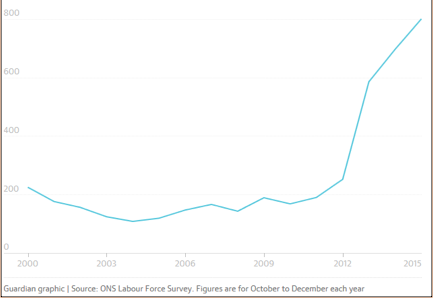 Why do recruiters hire eastern European migrants? The answer is not that they have a better work ethic, writes Heather Rolfe. The employers surveyed by the NIESR say they are seeking flexibility and want to recruit people on temporary and zero-hour contracts, which British workers are often unwilling or unable to accept. But this flexibility enables businesses to grow and prosper in a way that would otherwise be impossible.
Why do recruiters hire eastern European migrants? The answer is not that they have a better work ethic, writes Heather Rolfe. The employers surveyed by the NIESR say they are seeking flexibility and want to recruit people on temporary and zero-hour contracts, which British workers are often unwilling or unable to accept. But this flexibility enables businesses to grow and prosper in a way that would otherwise be impossible.
There is now little doubt that immigration will be the issue that will decide the referendum result. But it is danger of being decided on fiction rather than facts about its impact. We have never needed evidence about migration more. We do know a lot. We know that any statistical effects of migration on jobs and wages are very small. But statistics are often mistrusted. People’s lived experience tells them that something has happened to the labour market and the world of work and they believe migrants have played a part. They believe the availability of new workers from Eastern Europe has allowed employers to lower the bar, keeping pay levels down and offering temporary jobs or zero hours contracts. But what’s the evidence that migration has been instrumental in a process which finds an estimated 4.5 million people in insecure jobs? Through research involving 24 employers in the construction, hospitality and food and drink sectors, we set out to assess the evidence that migrants have changed our jobs.

Migrants are not targeted
The first and very clear message from our employers was that they have no active preference for migrants. They recruit them because they apply, because they are available. They are not, as the media often portrays, shunning ‘lazy Brits’ who prefer to live off our ‘broken’ welfare system rather than take on low skilled work. Employers said they do not tailor their methods to recruit either migrants or local worker but to maximise applications. Our employers rarely targeted migrants and did so only when shortages were most severe, typically by using agencies with EU migrants on their books.
The other clear message was that the shortages which lead employers to recruit migrants are often not skills based. Employers need people for low skilled tasks such as room cleaning, serving coffee and baking. As Martin Ruhs at the Migration Observatory has said, skills and shortages are slippery concepts. Shortages of low skilled labour can affect business operations as much as higher skills gaps, for example of welders or chefs, which our employers also experienced. Many of our employers relied on being able to recruit at least some migrants to fill low skilled roles.
Why don’t locals apply?
Employers say they want to employ locals but they encounter barriers. Unemployment nationally is around five percent and employers in areas of low population, including holiday destinations and food factories lack a pool of locals of working age. Low pay and intrinsic features of work in low skilled sectors also make local recruitment difficult, including the arduous nature of the work – and in construction and factory jobs, the work environment.
The widespread use of temporary and zero hours contracts is also likely to discourage British workers from applying for work in these sectors. Employers in all three sectors used these contracts and, in construction, the ultimate form of flexibility – self employment. As Jon Ingham of the jobs and careers site Glassdoor recently told the Guardian:
“The most common reason that unemployed people turn down zero-hours contracts is the need for a guaranteed level of income to make this a viable alternative to receiving unemployment benefit”.
Employers knew these were less acceptable to local workers than to migrants but said that their business model demanded labour flexibility: in the food industry to cope with the demands of supermarkets and customers; in construction with an uncertain supply of work; and in hospitality with seasonality and unpredictable customer demand. The use of these contracts has increased, particularly in the last 5 years, driven by competitive pressures, not by migration.

(source: theguardian.com)
EU migrants have flex appeal
Employers report little difference between migrants and British workers on measures such as productivity, work ethic and commitment. But there is one important difference between some EU migrants and British workers. Their mobility and short term goals make them more flexible. They can adjust their hours up and down in a way that British workers either can’t or aren’t willing to do. Such arrangements are more acceptable to migrants, particularly recent arrivals, than to British workers because they are less likely to be seeking stable employment, at least in the short term.
Flexible migrant labour has enabled businesses in low skilled sectors to grow. Jobs in low paid sectors have changed alongside the growth in EU migrant numbers, not because of it. A number of case study employers said they would not have been able to expand their businesses without access to EU migrants, and that they formed part of their future plans for growth. Where migrants form a minority of the workforce, which they most often do, this has helped to create employment opportunities for British workers. Employers need low skilled workers as much as they need higher level skills. For this reason, as our report concludes, ending free movement and restricting low skilled immigration is likely to damage business and threaten jobs in some of our key sectors.
This post represents the views of the author and not those of the BrexitVote blog, nor the LSE.
See also Heather Rolfe: How to cope with Brexit – an employers’ guide
Heather Rolfe is Principal Research Fellow at the NIESR.







Migrants are much more desperate with no home ties or life; they have left them behind in their home country, thus providing the cheap and very flexible labour sought by unscrupulous employers.
They do succeed but at what cost to our and their home countries?
I quote
“My name is John Baxevanidis.
I came to the UK to avoid national service, I am a “fun” of academia, I have attended 3 Universities and equally obtained 3 degrees including 2 Master’s degrees in the process. I was born in Greece and brought up by my very poor single mother. I went to a “run of the mill” state school until I was 17 where I barely graduated by the skin of my teeth. I had never made the slightest effort to study until that point in my life. At the age of 18 I came to the UK. Now I am a “top earner” (according to the statistics), drive an expensive car, but live in a small 3 bed detached house.
I consider myself to be “from the block”, yet at the same time much more cultured, educated and informed than most people I know. I know a lot of young people who have no dreams, no aspirations and consequently they are going nowhere. However, they belong to a “social class” higher than mine. Can you connect the dots? There were no opportunities presented to me at any moment in my life. My parents and I “forced” them. Cultural and geographical idiosyncrasies play a huge role. So yes in median/average/statistical terms there are hundreds of different factors that “micro-affect” and “micro-influence” classes. People tend to stick to where they are (in statistical terms at least) because they are not allowed by “society” to go anywhere else. This is a “macro” factor. I’m a cynic and a realist and I do not believe any time soon that “society” will ever allow equality or freedom. If you want to explore the answer to your question, you have to go back in history to understand it better.
Do you really, truly think that a different tax system, policy or law will eliminate this problem? Think with your heart not your calculator and you will probably realise that it will not make much difference.
Do the starving and the diseased have equal opportunities in this world? Why is that? What is the social and economic class of a thousand generations born in poverty, disease or war? But I know this is a different kettle of fish because I am referring to an entirely different group of people…different demographics…different “statistical groups”, blah, blah, hence let’s not talk about them…
This country has an educational system which is presented by society as “one of the best”. Yet if you speak to foreign people in education (school or university) will testify that the level of education in England at least (as I am not aware of the rest of the UK) is very poor. Schools dish out “tripple” A’s or double stars or whatever, like shops give out flyers in the streets, yet children are still just about literate in comparison with other countries. I am not just exaggerating for a humorous effect, I have met plenty of such kids and University graduate later on, who lag just as much in their abilities and knowledge. When I did my first degree in the University of Manchester most of the English students had to go to “night school” to learn basic maths before proceeding with the rest of the class. The university already had this facility, aware of the lack of knowledge. Don’t get me wrong, England still breeds fantastic scientists and brilliant minds, but we are talking about the average and statistical here after all. There is no recipe for the road to success. Academia loves boxes and statistics and graphs, etc. What makes you as a person? Your social class, your education, your salary, your parents’ wealth, your manners, your empathy towards others, your religion, the car you drive? Why do we care about social mobility? (I know most do, it’s rhetorical question) Our “care and concern” about social and economic mobility is what pushes people further into extremism, vanity, but also apathy. Who says that going up will make you happy? Success is measured differently by everybody.”
Nonsense. I’m a lone mother and came here with my then 9yo son. I speak 3 languages and work as a receptionist.
These stereotypes nauseate me and reek of racism.
Signed
Black and Italian.
It’s people like you that have caused working class indigenous people to become impoverished, I’m so glad Britain will be out of the EU now a good middle finger to all you uncaring profit crazed elitist luvvies who haven’t spent a day in the real world.
And the conservatives have won the UK general election putting labour to utter laughing shame.
Ms. Rolfe:
Yours is a narrowly focused view. There is an entirely different view to yours.
That view is that without ALL those migrants the small enterprises would grow but would have to pay more in wages than they get away with in paying to migrants.
Guess which view gets the votes in the referendum?
“The employers surveyed by the NIESR say they are seeking flexibility and want to recruit people on temporary and zero-hour contracts, which British workers are often unwilling or unable to accept.”
So the argument is that employers don’t like the workforce they have in the citizens of the nation, therefore the citizenry needs to be replaced. I guess that would be OK if the interests of the larger society were not actually dependent on the well-being of the charter members of that society.
Ms Rolfe
The content in this article is one of the main reasons why people voted out.
The stereotyping of British workers, your bias viewpoint and indication that British workers are incapable, inflexible and lazy, these put downs to justify and stress for the need and continuous inflow of eastern european migrant workers is ridiculous.
Low-skilled workers from Eastern Europe depress wages, ending free movement and restricting low skilled immigration is the way forward to relieve conjestion on the UK job market